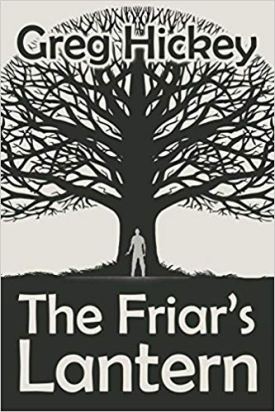 The hook of The Friar’s Lantern is an undeniably great one: biochemists are running an experiment to see if people’s actions can be determined to a narrow degree simply based off of chemicals and brain scans. You go in, you get an MRI; a week later, you return and are presented with two boxes. Computers have attempted to guess whether you will pick one box (which possibly contains a million dollars) or both (one may contain a thousand dollars, and the second may either have that aforementioned million dollars or nothing at all). Based off of the outcome, and how accurate the experiment is, you could come away very rich – but what will that say about your free will?
The hook of The Friar’s Lantern is an undeniably great one: biochemists are running an experiment to see if people’s actions can be determined to a narrow degree simply based off of chemicals and brain scans. You go in, you get an MRI; a week later, you return and are presented with two boxes. Computers have attempted to guess whether you will pick one box (which possibly contains a million dollars) or both (one may contain a thousand dollars, and the second may either have that aforementioned million dollars or nothing at all). Based off of the outcome, and how accurate the experiment is, you could come away very rich – but what will that say about your free will?
Author Greg Hickey explores this idea in all of its rich, fascinating complexity, allowing his characters to debate the differences between free will and determinism, exploring the disconnect between the agency we feel and the science that underlines our day to day choices and lives. More than that, The Friar’s Lantern finds other ways to take on these ideas, ranging from minor conversations with a devoutly Calvinist street preacher to a murder trial where the question boils down to “how much free will can we exert over our emotions?”
But most notably, Hickey chooses to make The Friar’s Lantern into a “choose your own adventure” novel, with choices throughout, branching narratives, and a second-person narrative that puts the reader in control of the story. It’s an interesting decision, but one that makes sense, given the questions raised by the book – how better to explore the ramifications of “free will” than by giving the reader a sense of free will to explore the novel?
This is an ambitious structure for a novel, and it’s not hard to come away from The Friar’s Lantern impressed by what Hickey has taken on. That will go doubly true if you re-read the book, following the different branches and seeing how they unfold. (I ended up mapping out the book’s choices to make sure that I didn’t miss any of them, since I felt like I needed to do that in order to review it.) Hickey does some interesting things here, essentially “guiding” the reader like a magician forces you to pick a certain card without you ever realizing the games he’s playing. And as you read the different branches, it’s fascinating to see how Hickey unfolds conversations in parallel, finding odd branches and details that make them stand out, or sometimes reversing perspectives.
My problems with The Friar’s Lantern, really, came down to the ending, which felt cheap in a way the rest of the book really didn’t. Without getting into spoilers, there was a sense that “the house always wins” that came along with the ending, and took away a bit from the way the book so often seemed to play with notions of free will and shaping the world around you. It’s not that I mind the sense of the inevitable, but Hickey doesn’t quite stick the ending, and it ends up feeling like a shrug rather than a moment where you see how all your paths have led you here. (I couldn’t help but compare this to the incredible story by Richard Salter called “Your Choice,” which used a “choose your own adventure” format to explore the inevitability of death and the way our fate is inescapable, and did it with grace and elegance, nailing the ending and giving the story an impact that Hickey never quite does. If you want to read it, it’s in the incredible collection This is How You Die.)
The more I think about The Friar’s Lantern, the more I come away impressed with what Hickey took on, though. He takes on complex themes and finds a compelling way to explore them, using the form and structure of his novel to immerse the reader in his debate without ever making that obvious. That the story doesn’t really stick the ending all that well and left me a bit disappointed shouldn’t really take away from the craft and interesting approach that Hickey mostly pulls off; this is a fascinating experiment, and it stands out from the usual crowd simply by virtue of its ambition and unique ideas.

One thought on “The Friar’s Lantern, by Greg Hickey / *** ½”